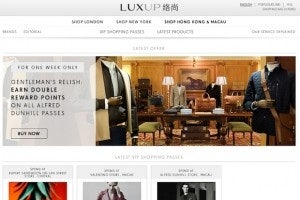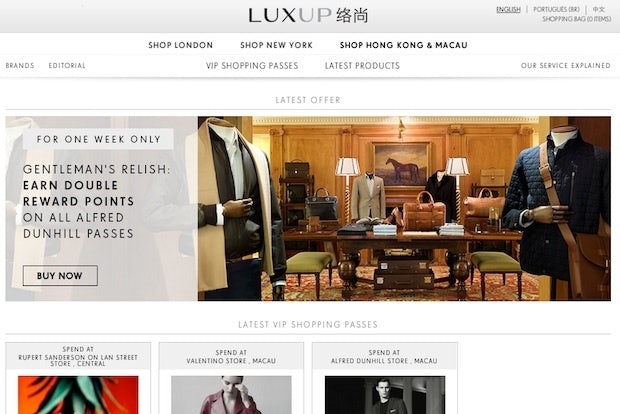Be Crystal-Clear In Communicating Mission, Understand Local Particularities#

In a must-read column in the Business of Fashion, editor Imran Amed looks at the developing story of the emerging markets-focused e-commerce site
Luxup#
, which made a high-profile debut two years ago. Though the site was, as recently as January of this year, called "a virtual gateway into a world of luxury boutiques that is currently unrivaled," the site has apparently encountered turbulence as of late, with an abrupt announcement last week that it would "cease trading to evaluate its strategic options."
Initially invitation-only, and first aimed at outbound Chinese luxury shoppers (then expanded to their Brazilian counterparts) with a penchant for international shopping sprees, the site more recently went open to the public, giving members access to special offerings in New York and London as well as Hong Kong and Macau.
According to Amed, however, a key issue with Luxup's model has been confusion among observers about the company's core business proposition. Despite a top-notch team and strong market opportunity -- particularly as Chinese tourist-shoppers intensify their shelf-clearing mission in Europe and look for exclusive brand access -- absent a crystal-clear and easily understood brand narrative, Luxup's prospects remain somewhat murky.
But less-than-stellar communication is only part of the problem, according to the column. Adds Amed,
There may have been other challenges, as well. Senior Chinese luxury executives said to me that the business model was culturally flawed. The Chinese, they said, would be unwilling to make payments in advance for products that they had yet to see, as was required by Luxup’s business model. Sure they would like luxury discounts and access to exclusive products, but according to these experts, it would be almost impossible to get Chinese consumers to lay out their cash in advance, no matter what you offered them in return, especially if they weren’t sure they were going to find anything in the store to buy.
To put a finer point on this, what Luxup appears to be experiencing with Chinese consumers is a complication shared by many players in China's high-end online retail market: the market is very new to luxury e-commerce and remains (in very general terms) bifurcated between a full-price model and a "race-to-the-bottom" discount model. Being more service- and exclusive-offer-based -- the "sight unseen" model described in Amed's column -- Luxup is essentially seeing the worst of both worlds in China -- more sophisticated, demanding shoppers who can afford the best, but still want discounts and a raft of perks. (And if they don't get them, they'll look elsewhere.)

One additional point not raised in the article is that Luxup's model, a mix of brand exclusives, editorial/educational content, and event access, is -- in one way or another -- also used by Chinese e-commerce players like Shangpin and others, meaning the market is not as wide open in China as it may seem. Additionally, in terms of home-grown Chinese payment methods, the site only lists Alipay, while Chinese online shoppers have also shown a strong preference for UnionPay or even cash-on-delivery (COD).
Yet none of these things are, in and of themselves, deal-breakers -- and it must be said that Luxup's model still has potential in China as new high-end consumers are minted. However, there is also the possibility that the platform was too much, too soon for the nascent Chinese luxury e-commerce market. For the site's sake, we hope the current restructuring effort is simply a way to take a breath and re-localize before redoubling its China (and Brazil) efforts.
